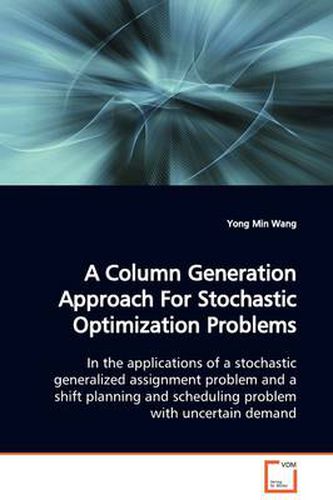Readings Newsletter
Become a Readings Member to make your shopping experience even easier.
Sign in or sign up for free!
You’re not far away from qualifying for FREE standard shipping within Australia
You’ve qualified for FREE standard shipping within Australia
The cart is loading…






This title is printed to order. This book may have been self-published. If so, we cannot guarantee the quality of the content. In the main most books will have gone through the editing process however some may not. We therefore suggest that you be aware of this before ordering this book. If in doubt check either the author or publisher’s details as we are unable to accept any returns unless they are faulty. Please contact us if you have any questions.
Understanding how uncertainty effects the dynamics and behavior of an organization is a critical aspect of system design. Models and methods that take uncertainty into account can lead to significant reductions in cost. This book investigates the use of stochastic optimization models for a generalized assignment problem (GAP) with uncertain resource capacity and a shift planning and scheduling problem (SPSP) with unknown demand. For the GAP, the first stage decisions correspond to an assignment of jobs to agents. Penalties are incurred when the assignments do not permit all demand to be satisfied. For the SPSP, the number of full-time and part-time employees, as well as the number of full- time shifts by type, must be specified before the demand is known. In the second stage, feasibility is addressed by allocating overtime and calling in temporary workers to handle spikes in the mail volume. This book contains the development and analysis of stochastic integer models for the GAP and the SPSP and the estimation of the demand distributions from historical data. To solve the associated stochastic integer problems, the column generation algorithms are developed.
$9.00 standard shipping within Australia
FREE standard shipping within Australia for orders over $100.00
Express & International shipping calculated at checkout
Stock availability can be subject to change without notice. We recommend calling the shop or contacting our online team to check availability of low stock items. Please see our Shopping Online page for more details.
This title is printed to order. This book may have been self-published. If so, we cannot guarantee the quality of the content. In the main most books will have gone through the editing process however some may not. We therefore suggest that you be aware of this before ordering this book. If in doubt check either the author or publisher’s details as we are unable to accept any returns unless they are faulty. Please contact us if you have any questions.
Understanding how uncertainty effects the dynamics and behavior of an organization is a critical aspect of system design. Models and methods that take uncertainty into account can lead to significant reductions in cost. This book investigates the use of stochastic optimization models for a generalized assignment problem (GAP) with uncertain resource capacity and a shift planning and scheduling problem (SPSP) with unknown demand. For the GAP, the first stage decisions correspond to an assignment of jobs to agents. Penalties are incurred when the assignments do not permit all demand to be satisfied. For the SPSP, the number of full-time and part-time employees, as well as the number of full- time shifts by type, must be specified before the demand is known. In the second stage, feasibility is addressed by allocating overtime and calling in temporary workers to handle spikes in the mail volume. This book contains the development and analysis of stochastic integer models for the GAP and the SPSP and the estimation of the demand distributions from historical data. To solve the associated stochastic integer problems, the column generation algorithms are developed.